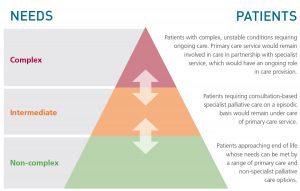What is Palliative Care?
Also on this page:
About Palliative Care
Palliative care is person and family-centred care provided for a person with a life-limiting illness, and for whom the primary goal is to optimise the quality of life.
It is available for everyone: young and old, with any terminal diagnosis, people of any ethnic or cultural background, wherever they live – in the city or in the country.
Palliative care is concerned with identifying and treating symptoms that may be physical, emotional, spiritual or social.
Often, palliative care and ‘end-of-life’ care get used interchangeably. For PCSA, end-of-life care includes physical, spiritual and psychosocial assessment, care and treatment delivered by health professionals and ancillary staff. It also includes the support of families and carers, and care of the patient’s body after their death. People are ‘approaching the end of life’ when they are likely to die within the next 12 months.
Also, people often think of palliative care as relating only to the last few days of life. PCSA describes this period when death is likely within a few days as ‘terminal phase’.
Both end-of-life and terminal phase care are seen as included within palliative care, as defined above.
If you require this information in another language, please view our other language resources page. where we have this information available in 16 languages.
What Palliative Care Does…
- provides relief from pain and other distressing symptoms;
- affirms life and regards dying as a normal process;
- intends neither to hasten or postpone death;
- integrates the psychological and spiritual aspects of patient care;
- offers a support system to help patients live as actively as possible until death;
- offers a support system to help the family cope during the patient’s illness and in their own bereavement;
- uses a team approach to address the needs of patients and their families, including bereavement counselling, if indicated;
- will enhance quality of life, and may also positively influence the course of illness.
FAQs
From the first diagnosis of a terminal illness palliative care can begin. You and your family can begin palliative care when you need and want support. Your needs might change as the disease stabilises and palliative care services might be reduced or stopped until further needs arise.
Palliative care can be provided by a number of different health professionals, depending on:
- The needs of the patient
- The resources and needs of the family and carers.
Many health professionals may be involved in delivering palliative care and generally, they will work as part of an interdisciplinary team. A palliative care team may include:
- General practitioners
- Specialist palliative care doctors and nurses
- Specialist doctors-oncologists, cardiologists, neurologists, respiratory physicians, geriatricians, surgeons
- Nurses
- Allied health professionals-pharmacists, occupational therapists, physiotherapists
- Social workers
- Grief and bereavement counselors
- Pastoral care workers
- Volunteers
You can contact the palliative care service in your area directly or through a health care professional. Your GP or hospital doctor may talk to you about palliative care as one option for ongoing professional care and support. With your permission your health care professional may refer you to a specialist palliative care service.
You can find your local palliative care provider here.
Care can be provided:
- at home
- in a hospital
- in an aged care home
- in a hospice
Most people with a terminal condition prefer to receive treatment at home, but this will depend on many factors, including:
- the nature of the illness
- how much support is available from the person’s family and community
- whether the person has someone who can care for them.
People with life-limiting illness have varying needs which can change over time. Different levels of service and different settings for care (e.g. community, residential or hospital) are required to meet these needs at different times. Not all people will require specialist palliative care services.
Figure by ACI, NSW Agency for Clinical Innovation
Visit our resources page to find useful link for education, support and other relevant organisations.

